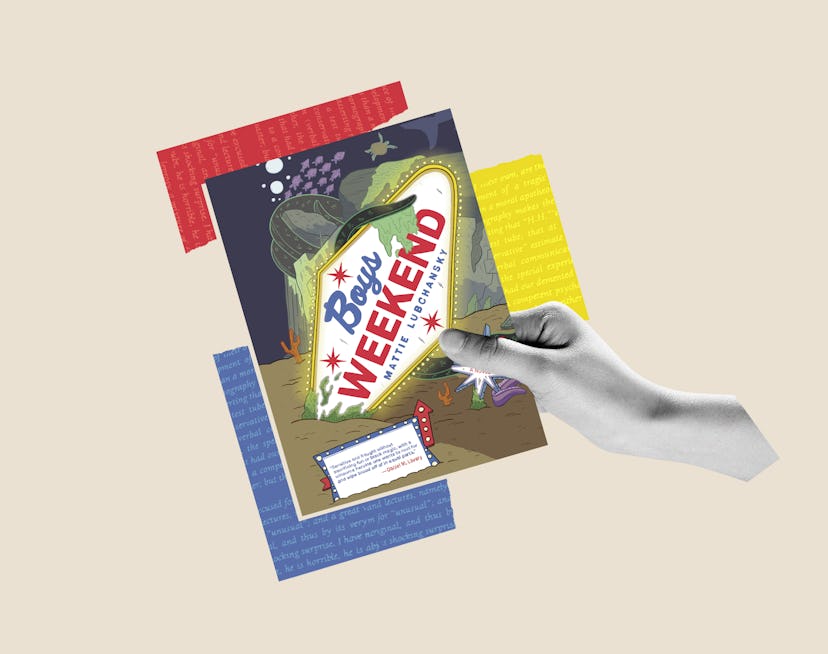Bustle Book Club
When Mattie Lubchansky’s Writing, They Become A “Little Goblin”
The author of the new graphic novel Boys Weekend discusses their creative habits.

Between Elena Ferrante’s Neapolitan novels and works like Sally Rooney’s Conversations with Friends, books on female friendship abound. Over the past few years, writers have begun to tackle the just-as-complex relationships shared between men, from Hua Hsu’s Pulitzer Prize-winning memoir Stay True to Jonathan Rosen’s staggering tome, The Best Minds. But Boys Weekend author Mattie Lubchansky, who identifies as nonbinary, couldn’t stop thinking about the other friendship dynamics that were missing from this fledgling canon — like the ones shared between trans and cisgendered friends. “A lot of trans narratives out there are more about romance, coming out, or the struggles of living in society generally,” Lubchansky tells Bustle. “But [coming out] makes you sort of re-contextualize all your friendships.”
So Lubchansky channeled their own lived experience into a book that could shed light on this “unmooring time” in their life and friendships. But even though Boys Weekend is inspired by real experiences, it doesn’t put much stock in realism. As a cartoonist by trade — and a lover of sci-fi and speculative fiction — Lubchansky decided to heighten their story into a trans horror graphic novel about a bachelor party set in a “hedonistic wonderland.” “Directly after coming out, I wasn't even out to most of my friends or even a lot of my family yet, I went on a bachelor weekend with my old college friends [where] I was my friend's best man,” they say of the inspiration for Boys Weekend. “I got the germ of the idea there, but a lot is different. They’re nice people who I like — not murderous freaks.”
Murderous freaks aside, it made a certain kind of sense to take view their bachelor party memories through the looking glass. During a transition, “you realize something about yourself and it all snaps in perspective,” Lubchansky says. “On some level you have to reconcile with a lot of stuff that you thought was real about you isn’t real. A lot of stuff you thought about the world isn’t real.”
Below, Lubchansky reflects on their love of procedurals, chicken parmesan, and the upcoming novel, Idlewild.
On reading about transness & fandom:
I just read a book called Idlewild by James Frankie Thomas, which will be out in a couple of months. It’s a really great story about two high school queers in Manhattan around September 2001. It’s the only book I've ever read where 9/11 is a minor plot point, and I'm not mad about it. It's about queerness, longing, transness, and fandom and it’s a really beautifully written book.
On Earth’s “number one food”:
When I'm writing, I turn into a little goblin. My wife is also a writer and we both work from home and most days for lunch I knock on the door of the room she's working in and we say to each other, “Scrounge?” Then we go scrounge around like animals [and eat] two hard-boiled eggs, string cheese, and a handful of popcorn.
Then when I accomplish something nice I like to reward myself with a big chicken parmesan. Because fried chicken is Earth's number one food — and chicken parmesan, to me, is the apotheosis of that.
On the contortions of drawing:
I share [this habit] with a lot of cartoonists, which is posing. If I'm penciling someone in a position I've drawn a lot of times before I can just sort of be like, “Okay, I know what this looks like.” But then it will be a kind of complicated one and I'll stand up and move my body into the position I want and then just look around at myself. Then there's stage three, which is taking lots of photos [of poses]. Or I Google all sorts of weird stuff, like when you need [to know] what something looks like from behind. So you're Googling the word “from behind” a lot.
On the power of procedurals:
When I'm drawing, I’m watching movies or TV. Because it's a different part of my brain processing the language and doing the visuals, I'll just find some really crappy procedural that has 75 seasons. During Boys Weekend I watched all of House. Sorry to Olivia Wilde — who plays a bisexual icon on it, of course — but it’s not a good show.
This interview has been edited and condensed for clarity.
This article was originally published on